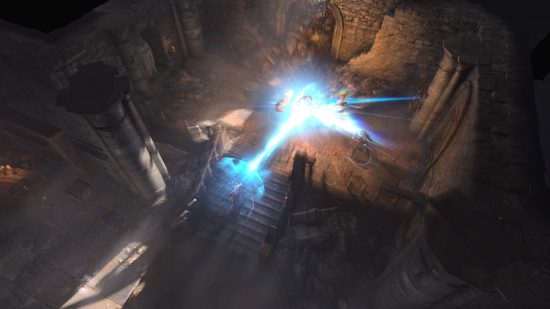Baldur’s Gate 3 is based on the rules for Dungeons and Dragons fifth edition, but it’s strayed from the source material in a variety of ways. This makes perfect sense – a tabletop and a videogame are two entirely different spaces, and what feels fun in one may make little sense for the other. But while Baldur’s Gate 3’s changes from D&D are designed for digital play, we think there are a few lessons the tabletop RPG could learn from its PC game cousin.
Below we’ve listed five ideas D&D (and perhaps creative DMs) could take from Baldur’s Gate 3. We’ve not focused too hard on individual Baldur’s Gate 3 classes, Baldur’s Gate 3 races, or Baldur’s Gate 3 builds – instead, these are more general changes that could apply to any game, however you prefer to play.
Here are a few lessons D&D could learn from Baldur’s Gate 3:
Environmental effects on attacks
In Baldur’s Gate 3, the environment you do battle in can affect your attacks, particularly 5e spells. Shoot a bolt of lightning into a puddle of water? Anyone standing there is in for a shock. Cast Thunderwave in a basement full of boxes? RIP boxes.
This is the kind of thing a Dungeon Master might add to their game with a DnD homebrew or ‘rule of cool’ ruling, but there are no real rules in fifth edition to accommodate the environment. We think this would be a worthy addition that adds new levels of creativity to combat.
Ordinary items made useful
Baldur’s Gate 3 makes the environment matter in combat, and the same goes for ordinary items. A well-timed bottle of grease can help you bypass a Strength roll, and we’ve already explained the power of combining electricity with a flagon of water.
D&D already has a host of 5e magic items, but these are used much more sparingly than in Baldur’s Gate 3. We think a big overhaul of magic items might upset the balance of 5e a bit too much, but the usefulness of ordinary items could definitely be given more thought. At the least, it’d make most looting sessions in D&D more exciting.
Give Intelligence-based skills real impact
Intelligence is the most common dump stat in all of D&D. If you’re not playing a DnD Artificer, DnD Wizard, or Wizard-adjacent subclass, you’ll almost never need to use it. Many DMs use Religion, History, Nature, and even Investigation roles to give snippets of lore that are rarely relevant to what you’re doing.
In Baldur’s Gate 3 Wizards are still the only DnD class that cares about Intelligence for spellcasting. But the game puts Intelligence-based DnD skills to much better use.
The game constantly makes passive rolls to see how much you know about the world during dialogue and general exploration. This helps you spot points of interest more easily and dig deeper in conversation – something a savvy DM could do more of in D&D if the rulebooks did more to encourage it.
Ditch exhaustion
In DnD exhaustion is a mechanic used to represent extreme fatigue. Lack of food and sleep, certain magical effects, and generally exerting yourself at the wrong time can give you a level of exhaustion. There are six levels on the exhaustion scale, which stack as you gain them – and eventually end in death, if you aren’t careful.
Exhaustion can make an interesting mechanic in a hyper-realistic, harsh exploration DnD campaign. But in our experience, that’s not the most popular way to play. In most cases, exhaustion is a cumbersome mechanic which slows down gameplay and dampens fun – it’s also responsible for the worst Barbarian subclass in 5e. It’s no surprise, then, that Baldur’s Gate 3 chose to cut it. D&D should probably do the same.
Create unique weapons with special actions
One of the most popular features in Baldur’s Gate 3 is the unique actions different weapons offer. A shortsword offers different attack options to a greataxe, for example. This offers a little more strategy than rolling attacks over and over for your Baldur’s Gate 3 Barbarian.
While it can be helpful to have simpler classes in D&D, and subclass features like Battle Maneuvers do spice things up as you level up, the DnD Fighter can feel a little bland when its main feature is “roll to attack” on repeat. Giving DnD weapons features that make them stand out from one another more could be a way to amend this.
Fortunately, D&D publisher Wizards of the Coast is already doing something along these lines. The ‘One DnD’ rulebooks set to come out in 2024 will introduce Weapon Masteries to the game, which expand the identities and abilities of individual weapons a bit more. It’s still in playtesting (and not without problems of its own), but it could be a step in the right direction if Baldur’s Gate 3 is anything to go by.
Our Baldur’s Gate 3 review may be out of the way, but we’ve not stopped obsessing over Larian’s game just yet. We’re still exploring Baldur’s Gate 3 romances with all the Baldur’s Gate 3 companions, testing various Baldur’s Gate 3 feats, and tweaking our favorite Baldur’s Gate 3 party composition – all of which you can read about in our dedicated guides.



